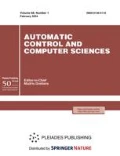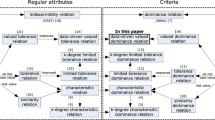Abstract
As one of the useful extensions of classical rough set approach, the dominance-based rough set approach has been successfully applied into multi-criteria decision problems. However, the traditional dominance-based rough set approach is only suitable for the condition attributes, which are positively related with classification analysis. To solve this problem, we propose an extension of the dominance-based rough set approach in incomplete information system by assuming the condition attributes, which are not only positively but also negatively related with classification analysis. Furthermore, by considering the existence of unknown values in incomplete information system, we present the concept of valued dominance relation, which shows the probability of an object is dominating another one with respect to the condition attributes. By using the valued dominance relation, the fuzzy dominance-based rough set models are also studied. A numerical example is employed to substantiate the conceptual arguments.
Similar content being viewed by others
References
Pawlak, Z., Rough Set Theory and Its Applications to Data Analysis, Cybernetics and Systems, 1998, vol. 29, pp. 661–688.
Pawlak, Z., Rough Sets and Intelligent Data Analysis, Information Sci., 2002, vol. 147, pp. 1–12.
Pawlak, Z. and Skowron, A., Rudiments of Rough Sets, Information Sci., 2007, vol. 177, pp. 3–27.
Pawlak, Z. and Skowron, A., Rough Sets: Some Extensions, Information Sci., 2007, vol. 177, pp. 28–40.
Pawlak, Z. and Skowron, A., Rough Sets and Boolean Reasoning, Information Sci., 2007, vol. 177, pp. 41–73.
Pawlak, Z., Some Remarks on Conflict Analysis, Eur. J. Operational Res., 2005, vol. 166, pp. 649–654.
Greco, S., Matarazzo, B., and Slowinski, R., Rough Approximation by Dominance Relations, Int. J. Intelligent Systems, 2002, vol. 17, pp. 153–171.
Greco, S., Matarazzo, B., and Slowinski, R., Rough Sets Theory for Multicriteria Decision Analysis, Eur. J. Operational Res., 2002, vol. 129, pp. 1–47.
Greco, S., Matarazzo, B., and Slowinski, R., Handing Missing Values in Rough Set Analysis of Multiattribute and Multi-Criteria Decision Problems, in New Directions in Rough Sets, Data Mining and Granular-Soft Computing, Lecture Notes in Artificial Intelligence, Zhong, N., Skowron, A., and Ohsuga, S., Eds., Berlin: Springer-Verlag, 1999, vol. 1711, pp. 146–157.
Blaszczynski, J., Greco, S., and Slowinski, R., Multi-Criteria Classification—A New Scheme for Application of Dominance-Based Decision Rules, Eur. J. Operational Res., 2007, vol. 181, pp. 1030–1044.
Fan, T.F., Liu, D.R., and Tzeng, G.H., Rough Set-Based Logics for Multicriteria Decision Analysis, Eur. J. Operational Res., 2007, vol. 182, pp. 340–355.
Greco, S., Inuiguchi, M., and Slowinski, R., Fuzzy Rough Sets and Multiple-Premise Gradual Decision Rules, Int. J. Approximate Reasoning, 2006, vol. 41, pp. 179–211.
M. Kryszkiewicz, Rough Set Approach to Incomplete Information Systems, Information Sci., 1998, vol. 112, pp. 39–49.
M. Kryszkiewicz, Rules in Incomplete Information Systems, Information Sci., 1999, vol. 113, pp. 271–292.
Grzymala-Busse, J.W., Characteristic Relations for Incomplete Data: a Generalization of the Indiscemibility Relation, in Proc. Third Int. Conf. on Rough Sets and Current Trends in Computing, Lecture Notes in Artificial Intelligence, Tsumoto, S., et al., Eds., Berlin: Springer-Verlag; New York: Heidelberg, 2004, vol. 3066, pp. 244–253.
Grzymala-Busse, J.W., Data with Missing Attribute Values: Generalization of Indiscemibility Relation and Rule Reduction, Transactions on Rough Sets I, Lecture Notes in Computer Science, Berlin: Springer-Verlag, 2004, vol. 3100.
Grzymala-Busse, J.W. and Wang, A.Y., Modified Algorithms LEM1 and LEM2 for Rule Induction from Data with Missing Attribute Values, in Proc. Fifth Int. Workshop on Rough Sets and Soft Computing at the Third Joint Conf. on Information Sci., Research TrianglePark, NC, 1997, pp. 69–72.
Grzymala-Busse, J.W., On the Unknown Attribute Values in Learning from Examples, in Proc. Sixth Int. Symposium on Methodologies for Intelligent Systems, Lecture Notes in Artificial Intelligence (Charlotte, North Carolina, October 16–19, 1991), Zbigniew, W. and Maria Z., Eds., Berlin: Springer-Verlag; New York: Heidelberg, 1991, vol. 542, pp. 368–377.
Latkowski, R., Flexible Indiscernibility Relations for Missing Attribute Values, Fundamenta Informaticae, 2005, vol. 67, pp. 131–147.
Wu, W.Z., Zhang, W.X., and Li, H.Z., Knowledge Acquisition in Incomplete Fuzzy Information Systems via the Rough Set Approach, Expert Systems, 2003, vol. 20, pp. 280–286.
Stefanowski, J. and Tsoukia’s, A., On the Extension of Rough Sets under Incomplete Information, in New Directions in Rough Sets, Data Mining and Granular-Soft Computing, Lecture Notes in Artificial Intelligence, Zhong, N., Skowron, A., and Ohsuga, S., Eds., Berlin: Springer-Verlag, 1999, vol. 1711, pp. 73–82.
Stefanowski, J. and Tsoukia’s, A., Incomplete Information Tables and Rough Classification, Computational Intelligence, 2001, vol. 17, pp. 545–566.
Leung, Y. and Li, D.Y., Maximal Consistent Block Technique for Rule Acquisition in Incomplete Information Systems, Information Sci., 2003, vol. 115, pp. 85–106.
Leung, Y., Wu, W.Z., and Zhang, W.X., Knowledge Acquisition in Incomplete Information Systems: a Rough Set Approach, Eur. J. Operational Res., 2006, vol. 168, pp. 164–180.
Shao, M.W. and Zhang, W.X., Dominance Relation and Rules in an Incomplete Ordered Information System, Int. J. Intelligent Systems, 2005, vol. 20, pp. 13–27.
Author information
Authors and Affiliations
Corresponding author
Additional information
The text was submitted in English by the authors.
About this article
Cite this article
Wei, L., Tang, Z., Wang, R. et al. Extensions of dominance-based rough set approach in incomplete information system. Aut. Conrol Comp. Sci. 42, 255–263 (2008). https://doi.org/10.3103/S0146411608050040
Received:
Published:
Issue Date:
DOI: https://doi.org/10.3103/S0146411608050040




